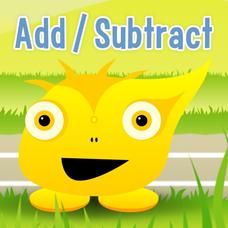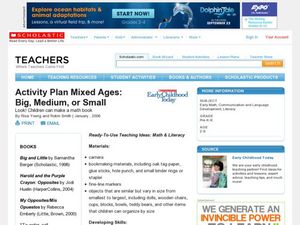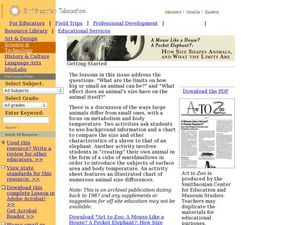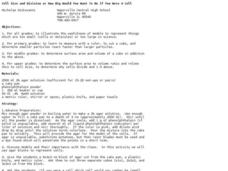Curated OER
Bugs
This is not just a worksheet, but an entire set of activities and worksheets that can accompany any unit on bugs or insects. Little learners will hone early math and literacy skills as they create mini-books, discriminate between big and...
Curated OER
Chandra Explores Angular Size
In this angular size instructional activity, students read about how astronomers determine the size of objects in the sky by using their angular size. Students are given equations that allow scientists to convert the angular size into...
Curated OER
Relative Size: Big and Little
Students work with big and little objects by placing objects in order small to large, and by completing a worksheet.
Center for Learning in Action
Properties of Balls
Enhance your states of matter lessons with a hands-on science investigation that compares six different balls' color, texture, size, weight, ability to bounce, and buoyancy.
Curated OER
Sampling Rocks
Students collect and sort rocks based on visible characteristics. In this statistics lesson, students determine adequate sample size and categorize rocks based on characteristics. The book Everybody Needs a Rock is read to...
Missouri Department of Elementary
Are You Balanced?
Balance scales create a strong visual of how an individual prioritizes one's self alongside their commitments to the community, school, and home. Scholars complete a graphic organizer then discuss their findings with their peers. A...
Macmillan Education
A Wrinkle in Time Discussion and Activity Guide
As you work through Madeleine L'Engle's A Wrinkle in Time, try out some or all of the 20 questions and activities included here. Useful for discussion questions, group assignments, or individual projects, this resource covers plot as...
Curated OER
How Big is a Foot?
Introducing measurement can be as simple as reading a book and then using measurement tools to understand how big a foot really is. The class reads and discusses the book How Big is a Foot? by Rolf Myller, stopping often to consider...
Curated OER
How Big Is A Humpback Whale?
Students explore humpback whales. In this humpback whale lesson plan, students determine the actual size of humpback whales and use diagrams to identify the major features of the humpback whale.
Curated OER
What Size Is It?
The concept of size is taught in this comparitive meaning of words lesson. Learners discuss the comparative qualities of words such as small, smaller, smallest. They demonstrate their understanding by drawing a picture.
Key Stage Fun
Squeebles Addition & Subtraction
The math monster is at it again, this time stealing all the cars and drivers that were to take part in the cart race. If their addition and subtraction facts are up to the challenge, young mathematicians can win the drivers' freedom...
Curated OER
Size: Bigger
In this size worksheet, students will focus on shapes that are bigger. Students will study 3 shapes and then draw the same shapes, but showing that they are bigger than those already pictured and using the corresponding colors on what...
Curated OER
Activity Plan Mixed Ages: Big, Medium, or Small
Students make a math book. In this early childhood math lesson plan, students develop language, observation, and math skills as they explore the sizes of objects and use cameras to take pictures for their own math booklet based on...
Curated OER
A Small Book of Small Things
Learners explore size relationships as they collect pictures of the small things in their world. In this early childhood math and literacy lesson, students gain an understanding of size differences and develop fine-motor and literacy...
Curated OER
Shapes, Colors, and Sizes Spelling Quiz
In this spelling quiz worksheet, students study the four multiple choice options for the shape, color, and size words. Students then write the letter of the correctly spelled word in the blank.
Curated OER
One Size Fits All?
Students describe the differences between an estimate and a guess. They create reasonable estimates based on comparison and activities. Students explain how estimation is helpful in showing the relative size on a scale. They also...
Curated OER
How Size Shapes Animals
Students investigate how size affects large and small animals differently. In this animal lesson plan, students determine how size affects different animals by constructing their own animal out of marshmallows. Once students create...
Curated OER
Geometric Shape Size Comparison Worksheet
In this geometric shape size comparison worksheet, students name the shape in each of three rows. They circle the largest shape in each row. They see blue circles, green squares, and orange diamonds.
Curated OER
Cell Size and Division or How Big Would You Want To Be if You Were a Cell?
Students investigate why cells divide. In this cell size lesson plan, students observe how far a solution travels into 3 different size model cells of agar. They answer questions about the most effect movement of "nutrients" into the...
Curated OER
Different Shapes
In this shapes instructional activity, students color all the big shapes blue, the middle sized shapes yellow and the small sized shapes red. Then they cut out all the shapes and sort them from big to small.
Curated OER
Animal Challenge 2
In this pitch activity, students examine a list of 6 animals. Students record the size of each animal as big or small and the sounds they make as high or low.
Curated OER
How Big is Big?
Students evaluate the number of servings in super-sized portions of various types of food. They explore the amount of sugar, fat, and other nutrients in super sized portions. They state that they plan to eat fewer super-sized portions of...
Colorado State University
Why Do Raindrops Sometimes Land Gently and Sometimes with a Splat?
A mouse can fall from large heights without injury! Air resistance is a large influence on small falling objects. In an exploratory lesson, young scholars build a raindrop bottle to compare the falling rate of different-sized objects.
Teach Engineering
An Inflated Impression of Mars
Help your class understand the magnitude of the distance between Earth and Mars with an activity that asks small groups to use balloons to create scale models of the Earth, Moon, and Mars. Class members figure out the distances...

























